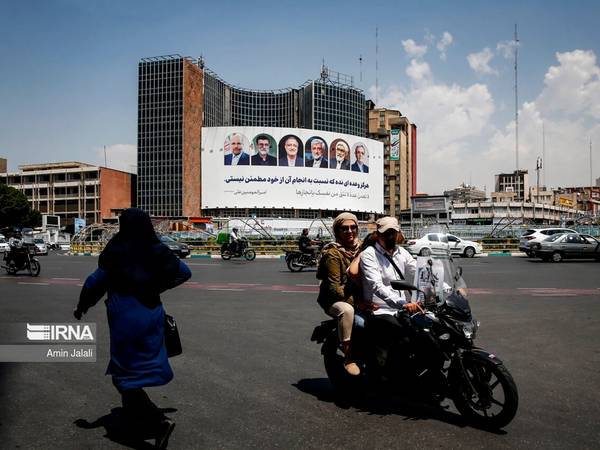As Iran approaches its next presidential election on Friday, the mood among a significant segment of the electorate is one of deep skepticism and disillusionment.
A recent poll by Gamaan reveals that only 22% of respondents intend to vote, while 65% plan to abstain, and 12% remain undecided. This significant potential drop in voter participation underscores a growing recognition among Iranians that elections under the Islamic Republic are neither free nor fair.
Since establishing the Islamic Republic in 1979, the Guardian Council has exercised significant control over who can run for office. This body, comprising clerics and jurists loyal to the Supreme Leader, routinely disqualifies candidates deemed insufficiently loyal to the regime.
Notably, even former presidents like Akbar Hashemi Rafsanjani, Mahmoud Ahmadinejad, Hassan Rouhani, and prominent figures such as former parliament speaker Ali Larijani have been disqualified.
This pattern illustrates the Council's stringent criteria that exclude not only dissidents but also high-ranking insiders who fall out of favor. Moreover, the Council's exclusion extends to women and non-Shi'a men, who are categorically barred from running for president. These practices ensure that only those who unequivocally support the regime's ideological and political goals can compete, transforming elections into formalities designed to maintain the status quo rather than reflect the people's will.
Over the years, voter turnout in Iran has steadily declined. The 2021 presidential election saw the lowest turnout in the country's history, officially with only 48.8% of eligible voters participating. This trend was seen as a clear indicator of public disillusionment with the electoral process, as many Iranians increasingly view elections as futile exercises in legitimizing authoritarian rule.
William J. Dobson, in his book, “The Dictator’s Learning Curve: Inside the Global Battle for Democracy,” argues that modern dictators have learned to adapt and refine their methods of control and repression, using less overtly violent methods. Instead, they employ tactics like censorship, legal manipulation, co-optation of opposition, and economic control. While the 20th-century dictators imprisoned, tortured, and executed their opponents, the 21st-century dictators prefer the voting system and the ballot box to achieve their goals.
A common tactic the regime uses is creating a strawman candidate to manipulate public perception. Candidate Saeed Jalili, a hardliner close to Supreme Leader Ali Khamenei, is presented as the Supreme Leader's favorite. Figures like Mohammad Javad Zarif, former foreign minister, then speak against Jalili, warning the public of the dangers of his potential win and urging them to vote for Masoud Pezeshkian, who is portrayed as a moderate alternative. However, this facade hides the reality that all significant decisions are made by Khamenei, and the president holds no real power. Pezeshkian does not identify as a reformist and repeatedly affirms his loyalty to Khamenei. This strategy aims to convince disgruntled voters that there is an acceptable alternative (Pezeshkian) to the imminent danger (Jalili).
Javad Zarif has worked in the Islamic Republic's foreign ministry since 1981 and has been a key architect of the failed JCPOA. Throughout his career, he has consistently justified and covered up the regime's atrocities on the world stage through lies, deception, and fallacy. Zarif attacked women's rights activist Masih Alinejad, calling her a traitor, and has shown no respect for women's rights, akin to the Taliban but dressed in suits. He uses "cultural relativism" to justify crushing dissent and human rights violations by the gender-apartheid Islamic regime. The bloodiest crackdown in Iran took place under so-called “reformist” President Hassan Rouhani and his chief propagandist Javad Zarif when 1,500 civilians were killed in just a few days in November 2019. Zarif's role in dismissing and ridiculing the slaughter of innocent Iranians highlights his complicity in the regime's crimes.
Additionally, candidate Mostafa Pour Mohammadi, a member of the “death commission” involved in the massacre of thousands of political prisoners in 1988, exemplifies the regime's brutal history. On August 28, 2016, referring to media reports about the mass prisoner killings and his involvement in them, Mostafa Pour Mohammadi said: “We are proud to have carried out God’s commandment concerning the [MEK]… I am at peace and have not lost any sleep all these years because I acted in accordance with law and Islam.”
Conversely, opposition groups, including secular democracy advocates, human rights activists, and political pundits, argue that meaningful change can only come through the complete overhaul of the current system. The regime's brutal crackdown on dissent, exemplified by the November 2019 protests where 1,500 civilians were killed, and the 2022 uprising of Woman-Life-Freedom has only strengthened this resolve (The Times of Israel).
The opposition's fight is not just against the regime's repressive tactics but also against the narrative that participating in the elections can bring about change. This perspective is echoed by many Iranians who have taken to the streets in protest, demanding an end to the Islamic Republic. The regime's oppressive actions, such as the imprisonment and torture of political dissidents, suppression of women's rights, and extensive censorship, have further alienated the populace.
Iranian citizens are increasingly aware that their participation in elections is being used to legitimize a system that oppresses them. The declining voter turnout reflects a broader disillusionment with the regime's promises of reform. As one protester aptly put it, voting is ignoring others' suffering and pain. This sentiment captures the frustration and anger of a populace that feels betrayed by a government that uses elections to perpetuate its rule rather than to reflect the people's will.
Drawing from Dobson’s insights, the international community must listen to the voices of the Iranian people and support their struggle for true democracy and human rights. The importance of international solidarity and support for democratic movements cannot be overstated. Like before, the upcoming election is neither free nor fair. Instead, it serves as a reminder of Iran's ongoing fight for justice and freedom.
The opinions expressed by the author are not necessarily the views of Iran International.
